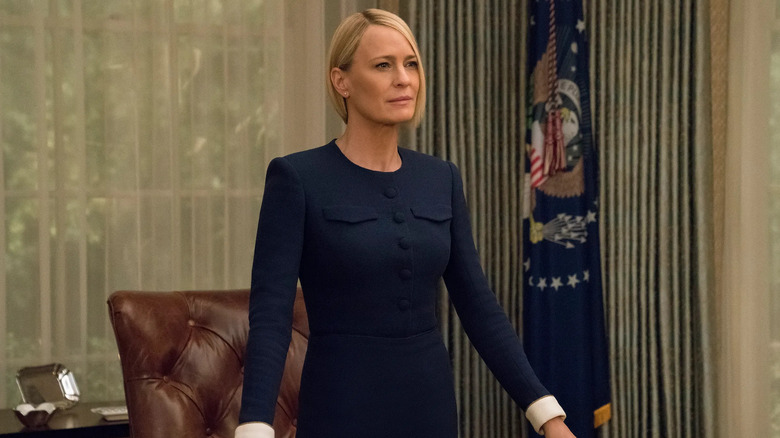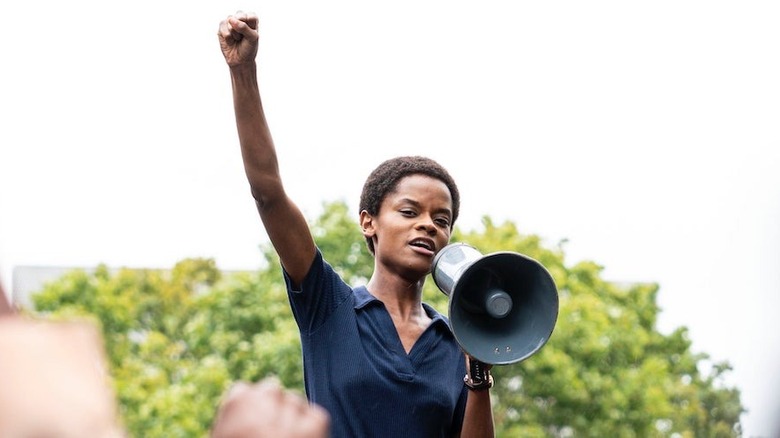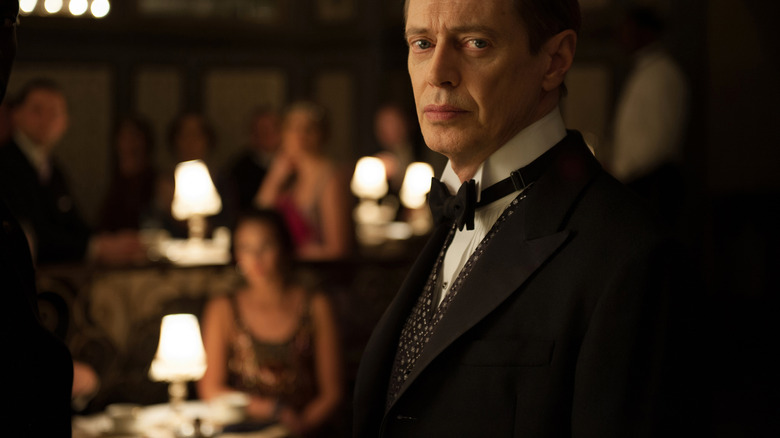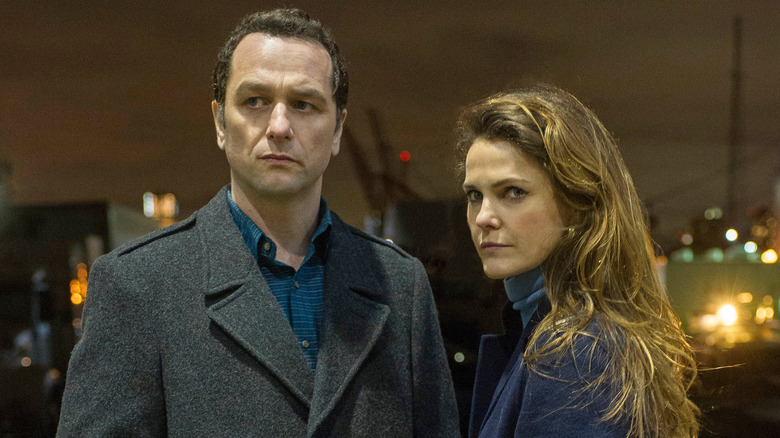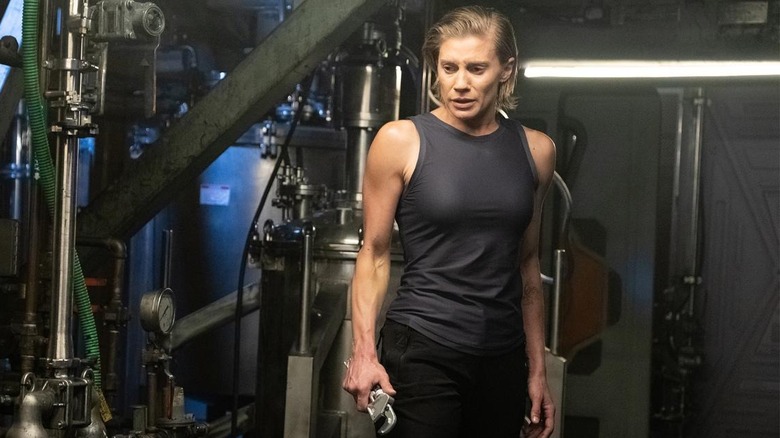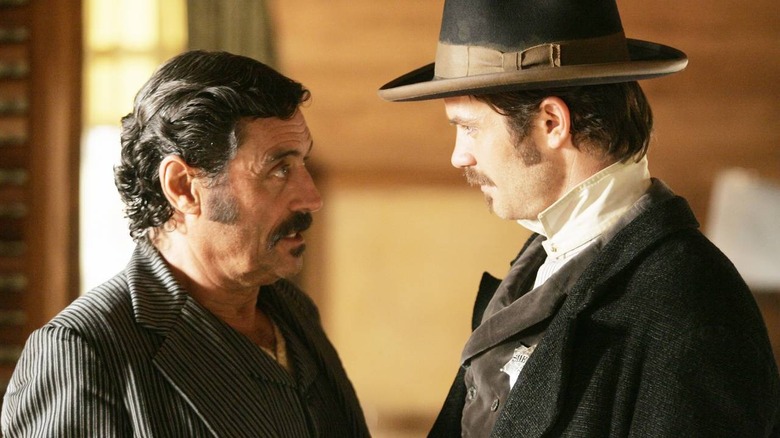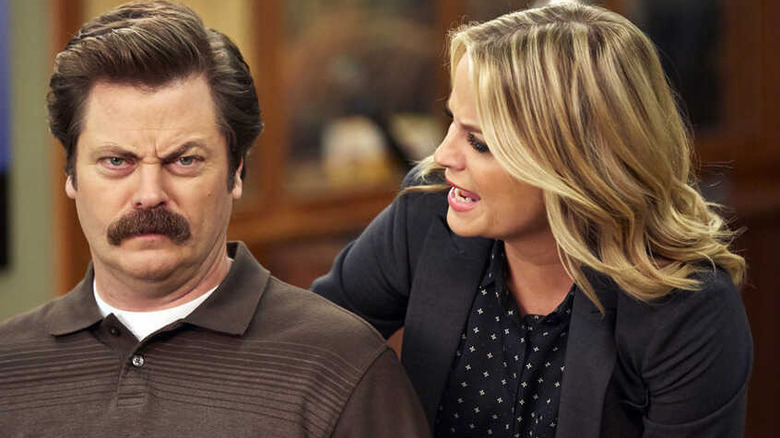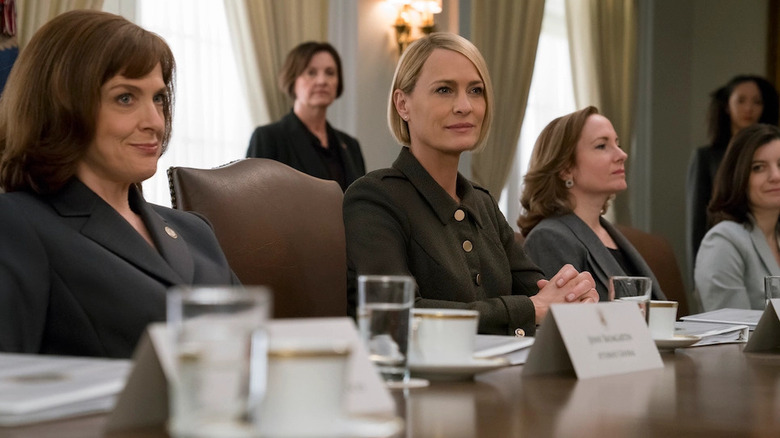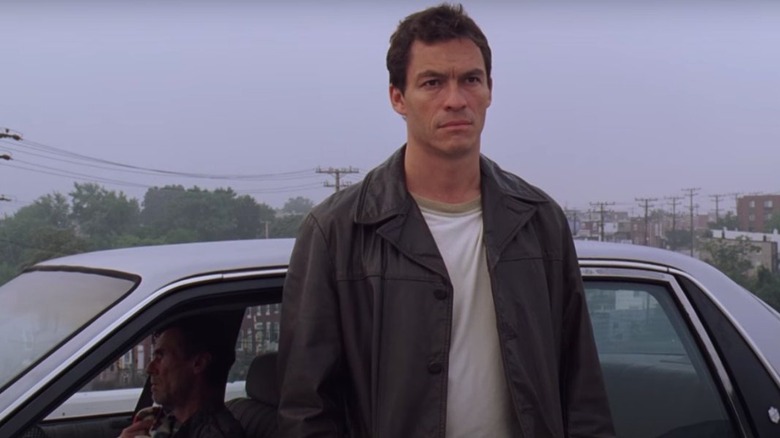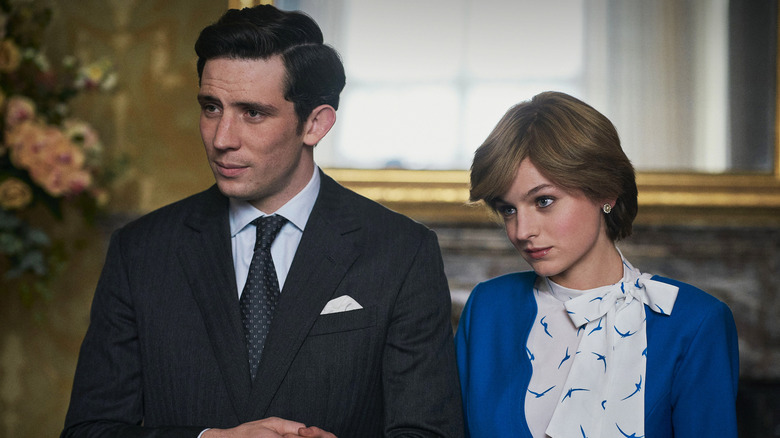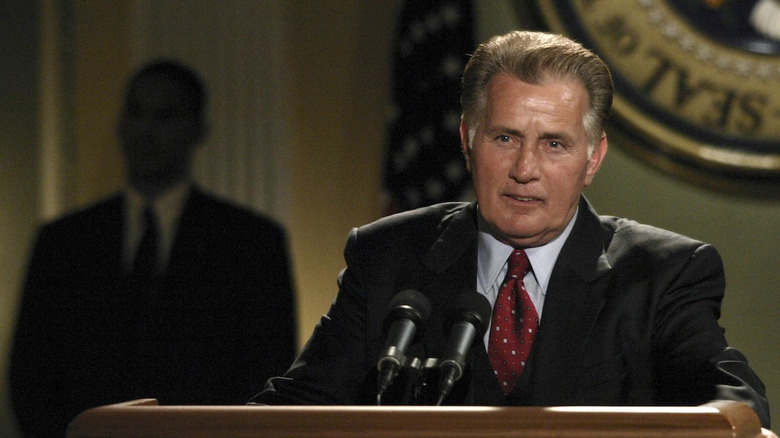The 10 Best Political Shows Of All Time, Ranked
Contrary to what some detractors may claim, art has always been political. It's often that the best way to learn about the political culture of a society is to look at how it is reflected in creative media. Film and television are instructive tools that allow the audience to examine the politics of the past, present, and future. It's incredible to see how television has evolved, and how this era of "peak TV" has become such a vibrant part of the cultural conversation. Television offers escapism, but it also allows us to understand today's issues by seeing empathetic stories and characters.
Even the most popular science fiction and fantasy shows right now have created their own political systems. The Disney+ "Star Wars" series "Andor" has found a way to address things like prison labor, social discrimination, and the rise of fascism within the galaxy far, far away. "House of the Dragon" explores the difficulty that female leaders have when facing inherent sexism. "The Lord of the Rings: The Rings of Power" has even shown how xenophobia and historical hatred have laid the groundwork for the dark lord Sauron to rise to power.
The problem that many television shows have faced in the last few years is contending with real events. After the election of former President Donald Trump in 2016 and the COVID-19 pandemic, some audiences likely struggled to see these events mirrored on television. Are we still looking to TV for escapism? Here are the top 10 greatest political shows of all time, ranked.
10. Small Axe
One of the greatest aspects of the modern era of streaming is seeing excellent filmmakers make the transition to television. Steve McQueen is among the best directors working today, but he took a break from cinema to create the anthology series "Small Axe." "Small Axe" draws from history to tell stories about various West Indian immigrants in London throughout the late 20th century. While each of these stories is a standalone installment, they connect thematically. It's a powerful indictment of the historical racism within London's political infrastructure.
McQueen brilliantly makes each installment feel unique in the way that it addresses the political situation. "Mangrove" is a stirring courtroom drama that exposes the prejudice within the justice system. However, "Lovers Rock" is simply a joyous celebration of Black excellence and draws from the films of the French New Wave movement. "Red, White, and Blue" is a disturbing reconsideration of racism within the London police force; it's impossible to watch it and not think about the recent protests against police brutality across the world.
"Alex Wheatle" explores the origin story of a brilliant Black British novelist, and "Education" identifies the tools of discrimination that exist within the school system. They generate empathy for the Black British experience. The only reason that "Small Axe" ranks lowest on this list is its brevity; while these episodes span many aspects of political culture, they're only a portion of the overall Black experience. While "Small Axe" is a tool of compassion, it's hardly comprehensive.
9. Boardwalk Empire
Following the game-changing success of "The Sopranos," HBO decided to look at a fascinating story from history. "Boardwalk Empire" follows the life of the Atlantic City political boss and kingpin Enoch "Nucky" Thompson (Steve Buscemi), based on the real-life Enoch L. Johnson. Nucky battles opponents in both the government and the mafia to have control over the liquor business amidst prohibition.
The detailed way that "Boardwalk Empire" explores political corruption made it a breakthrough. It is no wonder that the series felt so cinematic; the pilot was directed by veteran filmmaker Martin Scorsese. "Boardwalk Empire" also featured incredible production design, epic action sequences, and an incredible cast of characters. It provided breakout roles for some of today's finest actors, including Michael Shannon as the disgraced prohibition agent Nelson Van Alden, and Shea Whigham as Nucky's younger brother, Eli.
Although the series primarily focuses on the experiences of Nucky and his family, it does a great job of fleshing out other points of view. There's a particularly engaging storyline featuring the late great Michael K. Williams as Chalky White, a Black gangster who becomes Nucky's ally. The show does not present the events as black and white, instead depicting each of the main characters as flawed. "Boardwalk Empire" had the potential to rank even higher, but the disappointing final season marked a significant decline in quality. If the series hadn't sacrificed Nucky's character arc for the sake of a shocking plot twist, it could have contended for the very top spot on this list.
8. The Americans
The Cold War is a fascinating period of modern political history. The brilliant series "The Americans" follows the Soviet Union KGB agents Elizabeth (Keri Russell) and Philip Jennings (Matthew Rhys) as they pose as an American couple in the United States.
"The Americans" has a very interesting way of exploring the political debate of the era. One of the recurring themes within the series is assimilation; while Elizabeth is unflinchingly loyal to her home country, Phillip begins to open himself up to the American point of view. The couple makes the decision not to tell their children about their real occupation, but later in the series, they decide to begin training their teenage daughter, Paige (Holly Taylor). Will Paige accept this new reality, or will she remain loyal to the country that she has grown up in for her entire life?
The series also explores how the American political and espionage systems work. The Jennings' next-door neighbor, Stan Beeman (Noah Emmerich), is an employee of the FBI's counterintelligence unit. It's exciting, because the audience feels empathetic for both Stan and the Jennings, but knows that they're on opposite sides. Over its run, "The Americans" took some time to hone its identity. While the first few seasons feature relatively typical espionage sequences, the later seasons posed more interesting ethical questions. It's not until the final seasons that the show tackles "nature versus nurture" themes." Due to the slight inconsistency, "The Americans" certainly deserves a spot on this list, but not any higher.
7. Battlestar Galactica
The original 1978 science fiction series "Battlestar Galactica" may have inspired a cult following, but it's not exactly "Star Trek." However, the 2004 reboot by showrunner Ronald D. Moore stands as one of the greatest remakes in science fiction history. While the original series focused on nothing but spectacle, the reboot explored a complex political hierarchy.
The series was preceded by a 2003 miniseries that set up the story of humanity's war against the Cylons. 50,000 human survivors escape the Cylons' attacks in a Colonial Fleet, and the series follows the humans that serve aboard the massive spaceship "Galactica." In these desperate times, what sort of political structure should humans adopt? Can democracy truly exist within a time where humanity could be wiped out forever? Although the premise was imaginative, the themes felt relevant to the situation in the Middle East during the administration of President George W. Bush.
Part of the brilliance of the series was Moore's writing. Prior to creating the modern "Battlestar Galactica," Moore served as a writer on "Star Trek: The Next Generation." Although "The Next Generation" would occasionally address political topics like xenophobia, fascism, and corruption, "Battlestar Galactica" featured a serialized storyline. "Battlestar Galactica" ultimately struggled to pay off all of its recurring storylines, but its ambition was never in question and it influenced the development of other sci-fi reboots. Despite some of the lingering questions at the end of the series, it deserves placement on this list, but underneath more consistent shows.
6. Deadwood
Ever since the inception of cinema, American audiences have been fascinated by stories of the Old West. While some early westerns mythologized the nature of gunslingers and western adventures, they later began to address the reality of the era. In real life, the Old West was a period of American history that established many important political precedents. David Milch's brilliant HBO series "Deadwood" explored the hierarchy of Deadwood, South Dakota during the 1870s. Over the course of three seasons, the area turns from a simple camp into a growing town and is annexed by the Dakota Territory.
While this doesn't seem like it would be the premise for an exciting series, "Deadwood" explores the colorful cast of characters involved in these events. While the straight-laced sheriff Seth Bullock (Timothy Olyphant) tries to maintain a sense of justice, he's forced to become allies with the quirky saloon owner Al Swearengen (Ian McShane). The show also explores the importance of early medicine through the perspective of Dr. Amos Cochran (Brad Dourif), the town's hard-working doctor. What sort of sacrifices must be made in order to develop a community? "Deadwood" shows that it's not quite as idealistic as we would want to believe.
Sadly, the series was canceled at the end of the third season. While the show was finally given a proper conclusion in 2019 with "Deadwood: The Movie," it could have contended for an even higher spot on this list if it had been allowed to continue in its prime.
5. Parks and Recreation
Comedy is often an important tool for both healing and hope. Political comedy serves an important purpose: While it's fun to lampoon the nature of politicians, satire can help teach us about topics that may be difficult to discuss otherwise. However, the warmhearted NBC sitcom "Parks and Recreation" is a much more optimistic tribute to America's earnest politicians.
Similar to "The Office," "Parks and Recreation" is told in a mockumentary style. The series explores the employees of the Parks Department of Pawnee, a fictional town in Indiana. While the Parks Department does not necessarily seem like the most exciting place to work, the deputy director Leslie Knope (Amy Poehler) serves as an engaging protagonist. Leslie embodies what we want from politicians; she believes that the system can work if people are willing to open themselves up to different points of view. Leslie's attempts to wrangle her staff to do important work provides the series with many funny scenarios.
While Leslie is definitely a strong liberal, the series also shows the perspective of the libertarian Ron Swanson (Nick Offerman), who firmly believes in small government. Leslie's biggest opponent is indifference; people are willing to retain the status quo instead of building something new. It's impressive how many issues "Parks and Recreation" was able to address, and its empathy for different perspectives earns it a place within the top half of the list. However, the higher spots should belong to shows that approach these topics with more gravity.
4. House of Cards
The BBC series "House of Cards" is one of the most engaging deconstructions of British politics. The series also provided the basis for one of the most influential American political shows in history. "House of Cards" was one of the first original programs developed by Netflix. While this seemed like a novel concept in 2013, the "binge model" that began with "House of Cards" was rapidly adopted by other streaming networks. "House of Cards" proved that television could rival film in terms of moral complexity and performance.
"House of Cards" follows the schemes of Frank Underwood (Kevin Spacey), a politician from South Carolina's 5th congressional district. While Frank was promised a position in the cabinet of the newly elected President of the United States, Garrett Walker (Michel Gill), he is passed over. Frank launches a scheme to take over the government and claim the presidency for himself. With the help of his wife, Claire (Robin Wright), he begins conspiring to create a scandal that will allow him to seize control. The series pilot was directed by the legendary filmmaker David Fincher.
Compared to recent events, "House of Cards" was actually less tumultuous than reality. While the series is hard to rewatch given the allegations against Spacey, it's worth remembering the rest of the hardworking cast and crew. Sadly, Spacey's impact is still felt in the series, and it wouldn't be worth ranking it any higher because of that. It may be hard to recommend to new viewers.
3. The Wire
"The Wire" brilliantly deconstructs the infrastructure of Baltimore, and each season is even more complex. By building off of new characters and storylines, "The Wire" was able to create a stirring depiction of the relationship between drug dealers and the police department. It's incredible to see how showrunner David Simon balances fiction and reality; "The Wire" is just as informative as it is entertaining. It's also a rare show that has empathy for all of its characters. Unfortunately, the justice system that exists in the United States does not encourage healing.
The first season of "The Wire" follows Detective Jimmy McNulty (Dominic West) as he tries to convict drug dealers Avon Barksdale (Wood Harris) and Stringer Bell (Idris Elba). The second season shows the inadvertent effects that the drug trade has on the city's dock workers, including the union secretary-treasurer Frank Sobotka (Chris Bauer). Arguably, the third season of "The Wire" is its strongest as it introduces the young mayoral candidate Tommy Carcetti (Aidan Gillen), who seems like he might offer actual change. Season 4 explores the election's effect on the school system, and Season 5 follows the city's political reporters.
"The Wire" shows how former addicts like Bubbles (Andre Royo) can find a different path. It's a series that continues to offer insight into today's issues. "The Wire" was brilliant throughout its run; the only shows that rank higher are those that deal more directly with political representatives, and politics are only one element of "The Wire."
2. The Crown
The affairs of the Royal Family have been depicted countless times, but Netflix's "The Crown" is arguably the most exhaustive study of the monarchy's impact on 20th-century history. "The Crown" aims to show the entire reign of Queen Elizabeth II. She is a female monarch ascending to the throne after the tragic death of her father, King George VI (Jared Harris). Is the monarchy still relevant? It's a loaded question that "The Crown" tackles with compassion. While none of history's characters are painted as complete monsters, the series offers a balanced perspective on the queen's reign.
The first two seasons of "The Crown" explores a young Elizabeth's (Claire Foy) coronation and marital struggles with Prince Philip (Matt Smith). Foy's youth makes her relatable, and the show explores how Elizabeth comes into conflict with the "old guard" of male politicians. She is caught between duty and familial loyalty when her sister, Princess Margaret (Vanessa Kirby), is caught in a difficult marriage situation. Seasons 3 and 4 follow an older Elizabeth (Olivia Colman) as she struggles to relate to her son, Prince Charles (Josh O'Connor).
The controversial fifth season explores Charles' (Dominic West) breakup with Princess Diana (Elizabeth Debicki) and its subsequent impact on the public perception of the Royal Family. The series shows that there are both values and consequences that occur as a result of tradition. If the final season is able to match its predecessors' quality, it might even reach the top spot on the list.
1. The West Wing
It's possible that many Americans learned everything they know about the country's politics as a result of watching "The West Wing." Aaron Sorkin's brilliant, highly entertaining drama series offers incredible insight into the role of the President of the United States and his staff. The show explores the leadership of President Josiah "Jed" Bartlet (Martin Sheen), an optimistic leader who guides his country through hardship. It emphasizes the importance of his staff, including Leo McGarry (John Spencer), Josh Lyman (Bradley Whitford), Toby Ziegler (Richard Schiff), Sam Seaborn (Rob Lowe), and C.J. Cregg (Allison Janney).
"The West Wing" explores nearly everything that could happen during a presidency: difficult elections, national tragedies, nuclear threats, political scandals, attempted assassinations, and even a kidnapping! While the series dipped in quality after Sorkin departed as the showrunner at the end of Season 4, the later seasons improved once they started exploring the next election. It's a campaign where the audience can empathize with both the Democratic candidate, Matt Santos (Jimmy Smits), and the Republican candidate, Arnold Vinick (Alan Alda). When was the last time our nation had a choice between two completely reasonable candidates?
The optimism of "The West Wing" feels somewhat antiquated considering the events of the last few years. While the show was occasionally criticized for jumping the shark, it hardly felt less realistic than the tumultuous period our country has experienced. The lessons that can be learned from "The West Wing" are why it deserves the top spot.
